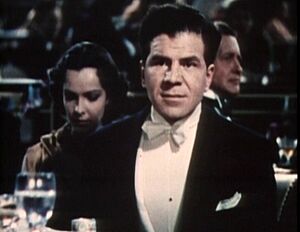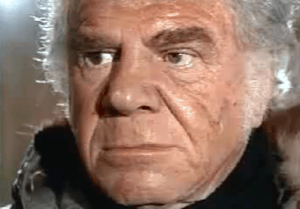Lionel Stander facts for kids
Quick facts for kids
Lionel Stander
|
|
|---|---|

Stander in A Star Is Born (1937)
|
|
| Born |
Lionel Jay Stander
January 11, 1908 New York City, U.S.
|
| Died | November 30, 1994 (aged 86) Los Angeles, California, U.S.
|
| Occupation | Actor |
| Years active | 1928–1994 |
| Spouse(s) |
Lucy Dietz
(m. 1928; div. 1936)Alice Twitchell
(m. 1938; div. 1942)Vehanne Monteagle
(m. 1945; div. 1950)Diana Radbec
(m. 1953; div. 1963)Maria Penn
(m. 1963; div. 1967)Stephanie Van Hennick
(m. 1971) |
| Children | 6 |
Lionel Jay Stander (born January 11, 1908 – died November 30, 1994) was an American actor. He was also a founding member of the Screen Actors Guild, a group that helps actors. Lionel Stander had a very long career, acting in plays, movies, radio shows, and TV shows for almost 70 years.
He was one of the first Hollywood actors called to speak before a government committee called the House Un-American Activities Committee. Because of this, he was put on a "blacklist" from the late 1940s until the mid-1960s. This meant he was not allowed to work in Hollywood.
After being blacklisted, Stander moved to Europe. There, he acted in many different types of movies, including several Spaghetti Westerns (Western movies made in Italy). He later returned to the United States. He became famous for playing Max, the loyal house manager, on the 1980s TV show Hart to Hart. For this role, he won a Golden Globe Award, which is a big award for actors.
Contents
Early Life and Education
Lionel Stander was born in The Bronx, New York City, on January 11, 1908. His parents were from Russia and were Jewish.
He attended the University of North Carolina at Chapel Hill for one year. While there, he acted in student plays.
Acting Career Highlights
Stander's acting career began in 1928 in a play called Him. He appeared in several plays in New York during the early 1930s.
Early Film Roles
Like many actors in New York, Stander also worked in short movies. He signed with Vitaphone and appeared in comedies, often playing a tough guy or a boss. His last short film was with Bob Hope in 1935.
That same year, he got a role in a feature film called The Scoundrel. He then moved to Hollywood and signed a contract with Columbia Pictures. Over the next three years, he acted in many films. Some of his notable movies include:
- Mr. Deeds Goes to Town (1936) with Gary Cooper
- Meet Nero Wolfe (1936)
- A Star Is Born (1937) with Janet Gaynor
Popular Radio Roles
Lionel Stander had a unique, deep voice and was good at different accents. This made him a popular actor on radio shows. In the 1930s and 1940s, he appeared on many programs, including:
- The Eddie Cantor Show
- Bing Crosby's Kraft Music Hall
- Lux Radio Theater
- The Fred Allen Show
In 1941, he starred in a short radio show called The Life of Riley. He also played the character Spider Schultz in two movies: The Milky Way (1936) and its remake, The Kid from Brooklyn (1946).
Stander also provided voices for animated cartoons. He voiced Buzz Buzzard in The Woody Woodpecker cartoons.
Standing Up for What's Right
Lionel Stander cared deeply about social justice and workers' rights. He was one of the people who helped start the Screen Actors Guild (SAG). In 1937, during a strike by studio workers, he encouraged actors to support the striking workers.
He also supported the Conference of Studio Unions, another group fighting for workers' rights. Stander was accused of supporting certain political ideas, but he always stood by his beliefs. He also helped raise money for the Republican side during the Spanish Civil War. He was part of groups that worked against Nazism.
The Hollywood Blacklist
In 1940, Lionel Stander was one of the first Hollywood actors called to appear before the House Un-American Activities Committee (HUAC). This was a government committee that investigated people they thought might be involved in "un-American activities," which often meant being linked to communism. After this, Stander was stopped from working in TV and radio.
Testifying Before HUAC
It took several years, but in May 1953, Stander testified at a HUAC hearing in New York. He became famous for being very uncooperative and witty during his testimony. He said he was not a Communist "now or yesterday." But when asked if he had ever been a member of the Communist Party, he refused to answer, calling it a "trick question."
Because of his refusal to cooperate, Lionel Stander was put on the Hollywood blacklist. This meant he was prevented from working in movies and television for a long time, from the late 1940s until 1965. His blacklisting was one of the longest in Hollywood history.
Working After the Blacklist
Being blacklisted made it very hard for Stander to find acting jobs. He worked in other fields, like being a stockbroker on Wall Street. He also continued to act in plays. He didn't return to Broadway until 1961 and to films until 1963.
Things started to get better for Stander when he moved to London in 1964 to act in a play. In 1965, he appeared in the film Promise Her Anything. That same year, he was in The Loved One, a comedy with many famous actors. In 1966, director Roman Polanski cast Stander in his only starring role, as a tough guy named Dickie in the movie Cul-de-sac.
Stander stayed in Europe and lived in Rome, Italy. He acted in many Spaghetti Westerns, including Once Upon a Time in the West, where he played a bartender named Max. He also played a villain in the 1972 thriller Caliber 9. In the 1970s, he appeared in a few English-language films like The Gang That Couldn't Shoot Straight with Robert De Niro, Steven Spielberg's 1941, and Martin Scorsese's New York, New York.
Hart to Hart and Later Roles
After 15 years in Europe, Stander moved back to the U.S. for the role he is most famous for. He played Max, the loyal house manager, cook, and driver for the wealthy detectives Jonathan and Jennifer Hart. They were played by Robert Wagner and Stefanie Powers on the TV series Hart to Hart, which ran from 1979 to 1984. In 1982, Stander won a Golden Globe Award for his role in the show.
In 1986, he became the voice of Kup in The Transformers: The Movie. He also guest-starred in the TV series Dream On in 1991. His last movie role was in The Last Good Time (1994), where he played a patient in a hospital.
Personal Life and Death
Lionel Stander passed away from lung cancer in Los Angeles, California, in 1994. He was 86 years old.
See also
 In Spanish: Lionel Stander para niños
In Spanish: Lionel Stander para niños
 | Laphonza Butler |
 | Daisy Bates |
 | Elizabeth Piper Ensley |


